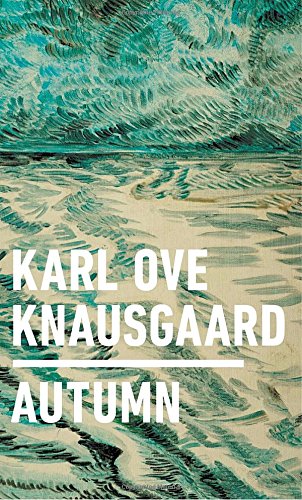By JOANNE MIKULA, Staff Writer
Photo from Amazon book page
From 2009 to 2011, Norwegian writer Karl Ove Knausgaard was absorbed in a monumental task; a series of six books provocatively titled “My Struggle” that chronicle his everyday life. Nothing was too insignificant nor too shameful to include in this series, from his morning cigarette and coffee routine to his disastrous teenage drinking binges and his crippling insecurities.
Knausgaard’s newest work, “Autumn”, seems in many ways a departure from his previous project. For starters, this slim, 200-something-page work stands in stark physical contrast to the nearly 3,600 pages of “My Struggle.”
“Autumn” is a series of letters and short essays addressed to Knausgaard’s unborn daughter. The opening letter establishes many themes of the collection: the interaction between man and nature, the differences between childhood and adulthood, the search for meaning, and the dogged persistence of life. The prospect of his daughter’s birth inspired Knausgaard to look at the world anew, and he makes a concerted effort to write on these themes with the wonder and innocence of a child.
Again, no subject is too banal or too ignominious for Knausgaard’s pen. His subjects range from the refined (“Van Gogh”, “loneliness”) to the mundane (“Tin Cans”) to the downright disgusting (Piss”, “Vomit”). Notably, Knausgaard addresses all these subjects with a similar tone and regard, betraying a desire to transcend the judgments we subconsciously carry throughout our daily lives.
In this same spirit, he begins each essay with simple observations or statements of fact about a given aspect of the world. “Thermos Flasks” opens with a physical description of the thermos while “The Sun” begins with the reflection that, although the sun is present every day of our lives, we can never look at it directly.
From these unassuming opening lines, Knausgaard develops each essay towards more profound meditations on life. Even a moment that is “not the beginning of anything, not even of an insight” leads Knausgaard two lines later to the realization that “I was still in the middle of something and always would be.”
His conclusions are often surprising. One gets the sense that Knausgaard allows himself to be led by words and personal associations; writing is a process of discovery for him rather than a mere transmission of thoughts onto the page.
An essay that begins with picture frames leads him to a discussion of the human tendency to categorize or “frame” the world and the contradictory, yet nonetheless persistent, “longing for authenticity” or “a world unframed.”
As exciting as these brief and unpredictable essays are, there is a frustratingly abrupt quality to many of them. At one point, Knausgaard writes, “That no one seeks the divine level of reality any more and that the churches stand empty means that it is no longer necessary. That it is no longer necessary means that the kingdom of heaven has come. There is nothing left to long for other than longing itself, of which the empty churches I can see from here have become a symbol.”
Similar progressions of ideas in “Autumn” leave readers floundering in its vagueness. What, for example, is the “divine level of reality”? And what does Knausgaard mean when he says “the kingdom of heaven has come?”
Perhaps Knausgaard intended this nebulous language to reflect the underdeveloped quality of our thought process. He may be suggesting that clarity and resolution are ultimately elusive.
Whatever the role of this imprecision, Knausgaard’s “Autumn” remains an intensely thought-provoking work. His imagery elevates daily life to a place of beauty, and his writing is a pressing reminder to find wonder in the world and witness it anew.
